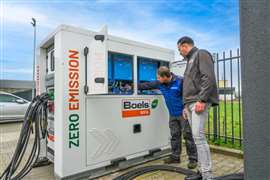Boels challenges misconceptions on electric equipment
03 September 2024
Boels Rental is seeking to debunk myths around electric equipment following a recent survey of construction professionals that revealed commonly held misconceptions.
Glenn Verburg, director fleet procurement at Boels Group, in an article on Boels’ website, wrote that there were a number of common myths surrounding electric equipment, primarily on issues such as charging, costs, power output and machine availability.
 A battery energy storage system in the Boels rental fleet. (Photo: Boels)
A battery energy storage system in the Boels rental fleet. (Photo: Boels)
More than 43% of professionals in the Boels Rental Construction Index survey – which received more than 400 responses in the Netherlands – believe the charging infrastructure is not sufficient.
Veburg wrote that charging can be a challenge, but that there are more options than commonly accepted; “When switching to electric equipment at construction sites, it is important to schedule regular recharging sessions as simply refuelling with diesel is no longer an option.
“For example, equipment can be charged using electricity from the grid during lunch breaks or at night. To prevent a lack of electricity availability during peak hours, peak shaving [using battery storage systems] can provide a solution.”
Almost a third or respondents also believe that electric equipment is not suitable for working on remote sites because of charging issues. Verburg said smart solutions were available, such as large battery storage systems in combination with mobile charging stations powered by solar energy.
More expensive?
The idea that electric equipment is more expensive was highlighted by almost 40% of respondents. Verburg acknowledged that the initial purchase price is often higher, but operational costs are generally lower.
“This is mainly due to the fact that electric equipment requires less maintenance,” he wrote, “Costs for maintenance amount to around 3% of the total costs compared to 10% for diesel equipment… When buying new equipment, it is important to look at more than just the purchase price.”
 Glenn Verburg, director fleet procurement at Boels Group. (Photo: Boels)
Glenn Verburg, director fleet procurement at Boels Group. (Photo: Boels)
The survey found that almost one in three construction professionals believe that electric equipment is less powerful than diesel-powered.
Verburg said modern batteries were becoming more powerful and had the advantage of only being used when the machine is being operated, unlike the ‘idling’ on conventional machines.
He also countered the view that every machine now has an electric equivalent; “the reality is that a lot of equipment does not yet have an electric equivalent, especially in the heavy-duty categories... Manufacturers are working diligently on developing these models, but for the time being, Stage V diesel options often remain the cleanest option.
“This is especially true when this equipment runs on biodiesel such as HVO100, which produces significantly lower emissions than standard diesel.”
Verburg reported that the market for electric alternatives to diesel is still evolving, but “electric equipment helps save costs and is better for the environment.”
The full article can be read here on the Boels website.
STAY CONNECTED



Receive the information you need when you need it through our world-leading magazines, newsletters and daily briefings.
CONNECT WITH THE TEAM






